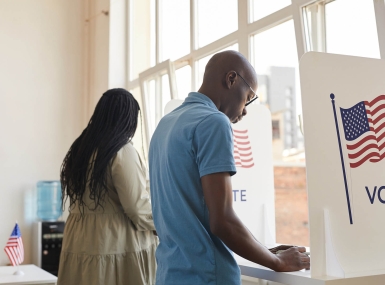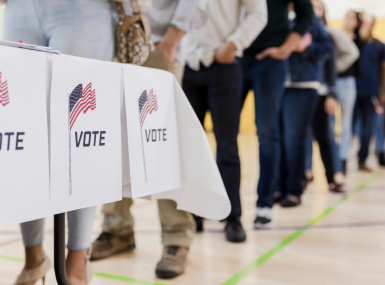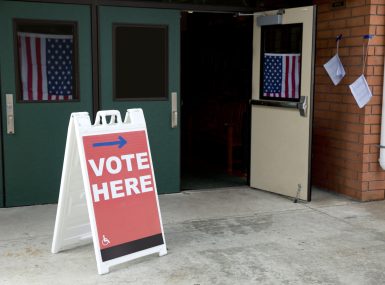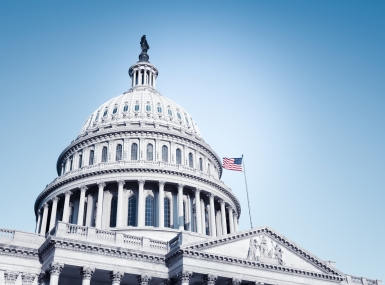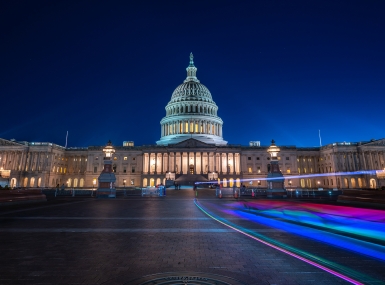Evolving Elections: How State Legislation Will Impact the County Role in Election Administration

Upcoming Events
Related News
Elections in the United States are administered in a highly decentralized process through which each state shapes its own election laws. In turn, states shape the role counties play in the months and weeks leading up to Election Day. While the federal government provides states and local governments with technical assistance and (in certain cases) funding, the majority of election responsibilities are concentrated at the state and local level.
Following the 2020 election cycle, state legislatures across the country considered and enacted several pieces of legislation related to the administration of elections. While a significant amount of these bills either extended or made permanent accessibility-related election policies implemented during the COVID-19 pandemic, some were reactionary and related to concerns about election security and the accuracy of the 2020 election.
In general, counties support election reform legislation that recognizes the crucial role they play in the elections process by enacting legislation that is fully funded and acknowledges the substantial variety of administration techniques employed in states and counties across the country.
Counties generally oppose election reform legislation that impose specific and impractical requirements on counties regarding election equipment, procedures and personnel responsibilities. Additionally, NACo opposes legislation that would require any specific post-election audit methodologies or would create additional federal testing and certification requirements to those of the U.S. Election Assistance Commission (EAC).
In 2021 and 2022, state legislatures considered and/or enacted legislation related to:
Funding of Elections
During the 2020 election cycle, county election officials experienced increased costs related to administering an election during the COVID-19 pandemic, the increase of vote-by-mail/absentee voting and accommodating polling places for social-distancing and other public health considerations. As such, several private, nonprofit organizations made grants available in 2020 to assist local governments absorb these additional costs and administer a safe and secure election. Concerns related to the potential undue influence of these groups in the elections process, however, has resulted in several states adopting legislation that prohibits the use of private, nongovernmental funds for costs associated to election administration.
States that considered/passed legislation prohibiting private funding of elections to some extent include (but are not limited to): Arizona, Arkansas, Georgia, Idaho, Kentucky, Pennsylvania, South Carolina, Texas, Utah, West Virginia and Wisconsin.
In the 117th Congress, federal elections legislation (American Confidence in Elections Act) was introduced in the U.S. House to remove the federal tax exemption of direct or indirect private funding for election administration to discourage the use of private funds to administer elections.
Counties are typically responsible for funding elections and rely on their revenues, state funding and the occasional federal infusion to administer elections. As such, counties support a consistent, predictable and dedicated federal funding stream to assist them with meeting the significant federal requirements already imposed on local governments administering elections. A consistent federal funding stream would also help alleviate budgetary constraints that in some cases lead to the use of donations and grants from private entities to fund the administration of elections.
Vote-by-mail/Absentee Ballots
Due to the increase in vote-by-mail/absentee ballots in the 2020 election cycle, several states adopted legislation related to vote-by-mail and the use of ballot drop-off boxes. Several states adopted or made permanent the use of all-mail voting or no-excuse absentee or granted counties the authority to implement curb-side voting, including California, Illinois and Virginia. Others, however, put in statute additional vote-by-mail security requirements such as requiring voter verification to be printed on ballot return envelopes, limiting the use of ballot boxes and implementing ballot box security requirements, putting in place chain of custody procedures for ballots cast outside a polling location and implementing online ballot tracking systems. These include (but are not limited to): Arizona, Colorado, Florida, Georgia, Idaho, Kansas, Kentucky, Louisiana, Pennsylvania, and South Carolina.
Some of these requirements related to the use of ballots outside a polling place often constitute a one-size-fits all approach for counties statewide. Because of the vast differences in geography, population sizes and language needs across counties, flexibility in elections administration is necessary and some degree of local control is needed to administer a safe and secure election that fits the needs of our citizens and ensure voters are able to participate in the election process.
NACo supports a domestic and international mail system that supports our election system and ensures that all voters, including those in the military and overseas, are able to fairly and freely participate in our elections. Such a system would include high quality delivery methods, tracking and notice of changes in the system to impacted local governments. Further, NACo opposes legislation that imposes specific and impractical requirements regarding equipment, procedures, and personnel responsibilities. Counties also oppose unfunded mandates and insufficient deadlines related to federal election reform.
Election System Security
Several bills considered/enacted by state legislatures in 2021 and 2022 would require the state and/or counties to establish certain election system security measures by statute. Several of these security requirements, including chain of custody procedures and ensuring voting machines are never connected to the internet, have been common practice amongst counties but are now statutorily required by state law. States that adopted election system security legislation include (but are not limited to): Arizona, Arkansas, Colorado, Georgia, Iowa, Kentucky, Mississippi, and South Carolina.
Voting machine testing is often conducted by voting machine vendors but require state certification before counties can purchase the machine. For testing and certification, some states adopt federal guidelines and standards and others create their own. As required by the Help America Vote Act of 2002 (HAVA), the U.S. Election Assistance Commission (EAC) develops Voluntary Voting System Guidelines (VVSG) which a majority of states adopt into law or practice to some degree. Several of the bills considered and passed by state legislatures in 2021 and 2022 codified certain VVSG standards.
NACo strongly supports the role and functions of the U.S. Election Assistance Commission (EAC), which recognizes and focuses on the importance of rigorous testing of voting equipment and brings together election technology experts and local election officials to develop guidelines and standards that protect our critical infrastructure and appreciates the efficiencies and cost savings of voluntary federal certification. NACo supports this process and opposes any legislation that seeks to create further federal certification processes beyond the EAC certification or imposes specific and impractical requirements regarding equipment, procedures, and personnel responsibilities. Further, counties oppose unfunded mandates and insufficient deadlines with regard to federal election reform.
Polling Place/Polling Locations
In 2021 and 2022, state legislatures considered several bills regarding the number of polling locations counties are to administer and counties’ authority to make changes or move polling locations. States which considered such proposals include Arkansas, Colorado, Georgia, Louisiana, Maryland, New York, South Carolina, Tennessee, Texas and Virginia. In general, these bills altered the population thresholds set by the state that require counties to establish a certain number of polling locations or implemented requirements that counties receive state-level approval before moving polling locations or changing the number available to voters.
In the 117th Congress, federal election legislation (the Freedom to Vote Act) that ultimately failed to pass the U.S. Senate would have also imposed polling location requirements on counties and other local governments nationwide, including the requirement to locate polling places within walking distance from public transportation stations when possible.
America’s 3,069 counties, boroughs and parishes are unique in population sizes and geography which necessitates flexibility in election administration and counties’ authority to make decisions to meet the needs of our communities and administer an election that is practical. One-size-fits-all policies related to the location and number of polling places often encroach on counties’ abilities to ensure our residents have the right to vote in an accessible, practical and cost-effective manner.
Further, election security and voter safety and accessibility is often dependent on counties’ authority to act in times of emergency. For example, in the event of a natural disaster or physical security threat, counties should have the authority to move polling locations without receiving approval from a state entity. Such a process would be burdensome and timely, and could ultimately prevent election officials from conducting their legal duties to administer an election.
Post-election Audits
Following concerns regarding interference in and the accuracy of the 2020 elections, states considered and passed legislation related to post-election audits. These include Alabama, Arizona, Georgia, Idaho, Illinois, Louisiana, Kentucky, Nevada, Pennsylvania, and South Carolina. Even when not selected to be audited by the state or required by state law, counties typically conduct post-election audits to ensure the accuracy of the election and boost voters’ confidence in the election process. Post-election audits typically involve a review of chain of custody procedures and the recount of certain batches of voter-marked paper ballots or voting machine records to compare against previous vote counts.
The implementation of risk-limiting audits, a kind of post-election audit based on the margin of votes between candidates in a certain race, has in recent years become more popular amongst election officials and state legislators. In 2021 and 2022, several state legislatures implemented risk limiting audits at the county level to some degree.
While NACo believes that post-election audits are an integral part of securing our elections and supports efforts to develop and assist counties in implementing best practices, NACo opposes any federal legislation that requires any specific methodologies.
Further, costs associated with post-election audits are often borne by the county with some support from the state.
Election Worker Protections
Following the 2020 elections and the rise in mis- and disinformation surrounding the administration of elections, many local election officials across the country have been recipients of threats, intimidation and harassment related to their role in the elections process. In response to the increase in frequency and intensity of these threats, several bills were introduced in state legislatures related to election worker protections in 2021 and 2022. The following four states enacted specific legislation that made it unlawful to threaten, coerce, intimidate or harass election officials or interfere with their duties related to elections: Colorado, Oregon, New Hampshire and Maine.
Counties urge the U.S. Congress to impose appropriate penalties for threats, harassment and intimidation towards election workers and their immediate families.
Explore Legislation By State
For more information about these bills, and other election bills being considered by the Pennsylvania legislature, please visit the County Commissioners Association of Pennsylvania
Public Funding of Elections (S 982; Act No. 82)
- Status: Enacted July 11, 2022
- The bill establishes an Election Integrity Grant Program to support election security upgrades but prohibits counties from using private funds, including gifts and donations, to fund the administration of elections. The prohibition of private funds for election administration went into effect in September 2022, just months before the general midterm elections in November 2022.
Number of Ballots to Be Printed and Specimen Ballots (H 1614; Act No. 66)
- Status: Enacted July 11, 2022
- This bill requires Pennsylvania counties to print enough ballots during a primary election for at least 50 percent of registered voters in the county and for at least 100 percent of registered voters during a general election, regardless of the number of voters who requested absentee ballots. The bill went into effect in September 2022, just months before the general midterm elections in November 2022.
Primaries and Elections (H 34)
- Status: pending
- If enacted, this bill would place into statute Pennsylvania counties’ existing practices regarding securely transporting ballots on election day, which includes keeping ballots in a secure container when not at a polling place.
Election Reform (H 2540)
- Status: pending
- If enacted, this bill would make several reforms to the administration of elections in Pennsylvania that counties would have to comply with including revising the deadline by which counties must accept absentee ballots and establishing a Bureau of Election Audits at the state level to conduct election audits.
For more information about these bills, and other election bills being considered by the Georgia legislature please visit the Association County Commissioners of Georgia (ACCG)
Elections and Primaries (S 202; Act No. 9)
- Status: Enacted March 25, 2021
- This bill includes several reforms to the administration of elections in Georgia, which includes allowing counties to begin processing absentee ballots prior to the election, revising the deadline by which counties must accept absentee ballots and providing counties with flexibility around voter machine to voter ratio mandates in non-general elections, all of which were priorities of Georgia counties. The bill, however, also included several provisions of concern to Georgia counties. This includes requiring counties use encrypted security ballot paper, limiting ballot drop box locations, mandating extensive election night reporting requirements and authorizing the Secretary of State to remove underperforming county election superintendents. These requirements went into effect July 2021 and were therefore in place for the primary and general midterm elections in November 2022.
- This bill included several legislative priorities of the Association County Commissioners of Georgia (ACCG) although ACCG expressed several concerns with this bill. ACCG’s full analysis of this bill is available here.
State Election Board (H 506)
- Status: pending
- If enacted, this bill would replace the current statewide requirement that voting machines be uniform statewide and paid for by the state with a new state testing and certification program for voting machines. While this would give counties flexibility to choose which state-tested and certified voting equipment to purchase, costs of new voting equipment would be borne by counties.
- ACCG’s analysis of this bill is available here.
Sealing of Ballots and Unused Security Paper (H 1359)
- Status: failed (adjournment)
- If enacted, the bill would mandate several ballot chain of custody procedures at the county level. This includes documentation requirements at each stage of the ballot’s lifecycle from the paper arriving at the county election office to the ballot being cast, tabulated and preserved.
Private Funding of Elections (H 1402)
- Status: failed (adjournment)
- If enacted, this bill would prohibit counties and election offices from accepting private funding for the administration of elections.
- ACCG’s analysis of this bill is available here.
For more information about these bills, and other election bills being considered by the Colorado legislature please visit Colorado Counties, Inc. (CCI)
Internal Election Security Measures (S 153; Act No. 322)
- Status: Enacted June 2, 2022
- The bill establishes additional security measures for voting equipment at the state level, requires county election staff receive election training and created a $1 million grant program to assist counties and local governments come into compliance with the bill.
- For more information on this bill and others the CCI 2022 legislative report is available here.
Protections for Election Officials (H 1273; Act No. 324)
- Status: Enacted June 2, 2022
- This bill makes threatening, coercing or intimating an election official, or the intent thereof, with the intent to interfere with the election process a state crime. It also prohibits individuals from making the personal information of election officials or their immediate family publicly available on the internet.
Expansion of Multilingual Ballot Access for Electors (H 1011; Act No. 366)
- Status: Enacted June 28, 2021
- The bill lowers the threshold of minority language speakers in a county that require in-person minority language ballots from 10,000 or more voting age citizens to 2,000 voting age citizens. This bill does not include state funding to assist counties meet this new requirement, which went into place in 2022.
- CCI opposed this measure. More information in this bill is available here.
For more information on these bills and others before the Arizona Legislature, please visit the Arizona Association of Counties
Early Ballots and Tracking Systems (S 1411; Act No. 358)
- Status: Enacted July 6, 2022
- This bill requires counties to provide early ballot tracking systems that allow voters to see if the ballot has been received and whether or not it has been verified or rejected. This bill does not go into effect until December 31, 2023.
Voting Equipment (S 1241)
- Status: Failed
- This bill, which passed both chambers of the Arizona legislature in 2021 but was not ultimately enacted, would make several changes to the county-level administration of elections. This includes requiring tabulation equipment to be disconnected from the internet and chain of custody documentation related to the delivery use and return of voting equipment and data storage devices to be implemented. Counties in Arizona and several counties across the nation already adhere by these standards.
Election Equipment (H 2359; Act No. 239)
- Status: Enacted April 28, 2021
- The bill requires counties by statute to secure voting machines and electronic pollbooks to prevent unauthorized access and requires county election offices to document and verify security procedures before a voting machine or electronic pollbook is placed into service. Counties in Arizona and several counties across the nation already adhere by these standards.
Elections and Private Funding (H 2569; Act No. 199)
- Status: Enacted April 9, 2022
- The bill prohibits counties and other local entities that administer elections for public office to use private funds from nongovernmental entities to fund the administration of elections.
Ballot Drop Boxes and Surveillance (S 1571)
- Status: failed (adjournment)
- If enacted, the bill would require ballot drop boxes to only accept one ballot at a time and no more than seven from one individual, and to generate a paper receipt stating the number of ballots accepted by the drop box from a person. The bill would also require ballot boxes to be monitored by video surveillance and would have prohibited completed ballots from being delivered via mail.
Early Election (S 1329; Act No. 232)
- Status: Enacted May 20, 2022 (enacted)
- This requires that counties, to the extent practicable, count the number of early ballots returned to voting locations on election day and post those totals with the unofficial results on election night. The bill also requires county election officials to enter this data for early ballots returned to the voting location on election day into the county’s ballot tracking system, if available, beginning on the day after the election.
Elections and Ballot Privacy Folders (HB 2362; Act No. 420)
- Status: Enacted July 9, 2021
- This bill requires ballot privacy folders be given to qualified voters in addition to their ballot.
For more information on these bills and others before the Washington State Legislature, please visit the Washington State Association of Counties
Harassment of Election Officials (S 5148)
- Status: failed (adjournment)
- This bill, that passed both chambers of the Washington State legislature but was ultimately not enacted, would make the harassment of election workers while carrying out their duties a class C felony in Washington State.
Ballot Locations (H 1716; Act No. 69)
- Status: Enacted March 17, 2022
- This bill statutorily requires counties to establish voting centers at county auditor’s offices or the division of elections office and in every city within the county with a population of over 100,000 people. Washington State is an entirely vote by mail state, but counties operate voting centers to allow voters to update information, receive assistance or cast a ballot in person. This bill went into effect on June 9, 2022, and was in place for both the 2022 primary and general midterm elections in Washington State.
For more information on these bills and others before the Wisconsin Legislature, please visit the Wisconsin Counties Association
Private Resources Used for Election Administration (A 173)
- Status: vetoed on June 30, 2021
- Passed by both chambers but vetoed by the Governor in June 2021, this bill would have prohibited the use of private funding and resources for election administration.
For more information on these bills and others before the Kentucky Legislature, please visit the Kentucky Association of Counties (KACo)
Election Administration Costs and Expenses (HB 301; Act No. 23)
- Status: Enacted March 24, 2022
- This bill requires all costs related to election administration be paid for using public funds and prohibits public employees from soliciting private funds for elections.
- Elections (HB 564; Act No. 87)
- Status: Enacted April 7, 2022
- This bill established a risk-limiting audit program, authorized in person early voting and implemented certain voting system security measures such as prohibiting voting machines from being connected to the internet and using tamper resistant seals on voting equipment. By law, Kentucky requires voting system testing to federal standards.
Elections (SB 216; Act No. 219)
- Status: Enacted April 13, 2022
- This bill requires voting equipment to be under surveillance for 30 days after an election and cannot be connected to the internet during this period.
- More information on this bill and others, the KACo 2022 Legislative Report is available here.
For more information on these bills and others before the South Carolina Legislature, please visit the South Carolina Association of Counties
Early Voting (SB 108; Act No. 15)
- Status: Enacted May 13, 2022
- This bill requires certain identity verification items be included on return-address envelopes for mail in ballots, authorizes the establishment of post-election audit methods andimplements certain voting system security measures such as prohibiting voting machines from being connected to the internet. Certain aspects of the bill, including the ID verification requirements for mail-in ballots, took effect in July 2022. South Carolina state law currently requires voting systems to be tested in federally accredited labs, however enactment of SB 108 requires features of the U.S. Election Assistance Commission’s (EAC) Voluntary Voting System Guidelines in statute.
- For more information on this bill and others, the South Carolina Association of Counties’ 2022 Acts that Affect Counties report is available here.
For more information on these bills and others before the Maryland Legislature, please visit the Maryland Association of Counties
Voting System Requirements (S 158; Act No. 35)
- Status: Enacted April 9, 2022
- This bill requires individual counties to pay for 50 percent of the state cost to acquire and implement uniform voting systems statewide and requires the number of available precinct polling places for the 2022 election cycle to equal the number available in 2018. Additionally, the bill gives the governor the sole ability to reduce the number of polling places during a declared state of emergency.
- The Maryland Association of Counties (MACo) supported this bill. An analysis of this bill from MACo is available here.
Election Law (HB 745; Act No. 43)
- Status: Enacted April 9, 2021
- This bill expands the required number of early voting centers counties are required to establish and operate by lowering the threshold of registered voters that triggers an increase in minimum voting locations. This bill, that took effect in October 2021 and was therefore in effect for the 2022 midterm election cycle, represented an unfunded mandate on Maryland counties.
- The Maryland Association of Counties (MACo) opposed this bill. Written testimony from the MACo regarding this bill is available here.
For more information on these bills and others before the Illinois State Legislature, please visit the Illinois State Association of Counties (ISACo)and the United Counties Council of Illinois (UCCI)
Election Code (H 1871; Act No. 1)
- Status: Enacted April 2, 2021
- This bill allows Help America Vote Act (HAVA) funds be used for maintenance and operation of ballot drop boxes and authorizes the use of curb-side voting.
- More information on this bill is available in the ISACo 2021 Public Acts Report, available here, and at UCCI’s legislative tracking site, available here.
Election Vote-by-Mail Notice (H 4857/S 3965)
- Status: pending`
- If enacted, this bill would exempt county election officials from sending required notifications prior to election day to voters that have opted in to permanent vote-by-mail or voters who requested to be excluded from permanent vote-by-mail alerting them that permanent vote-by-mail is an option, thus saving county election officials time and resources.
More information on this bill is available in the ISACo legislative tracking site, available here, and at UCCI’s legislative tracking site, available here.
*Please note this report is not intended to be a comprehensive overview of election related legislation introduced in state legislatures. For more information on state-level election bills please refer to the respective state association of counties.

